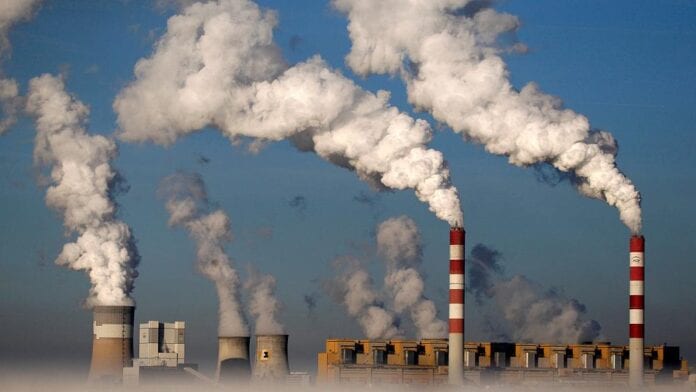On Clean Air Day 2021, cleantech business Airly has revealed its monthly insights into air pollution across Europe. This ranks cities* based on their air pollution levels as measured by levels of PM10 (Particulate Matter) and NO2 (Nitrogen Dioxide). Using sensors, Airly provides accurate, ultra-local, predictive data for governments, media and businesses to tackle the issue of air pollution head-on. Airly’s platform acts as a warning system for pollution at street level and in real time with greater accuracy and at lower cost for cities & enterprises.
PM10 analysis
PM10 is particulate matter (also called particle pollution), represents a mixture of solid particles and liquid droplets found in the air. Drops in concentrations are clearly visible when compared to April 2021, when some cities recorded much higher results, e.g. Milan (42.8), Łódź (29.1). Although the concentrations of PM10 decreased relatively, an Italian city (Naples) was in the lead again (23,91 mean CAQI), and a very high concentration of Spanish cities (Gijon, Sevilla, Oviedo) can also be noticed. PM10 concentrations in Polish cities dropped significantly – the highest was Tychy with a recorded average CAQI of (16,82).
The ranking of the most polluted large cities in Europe (PM10) for May 2021 is below:
| Rank | City | Country | European CAQI air quality index |
| 20 | Huelva | Spain | 15.86 |
| 19 | Częstochowa | Poland | 16.13 |
| 18 | Katowice region | Poland | 16.24 |
| 17 | Kielce | Poland | 16.32 |
| 16 | Rotterdam | The Netherlands | 16.35 |
| 15 | Łódź | Poland | 16.57 |
| 14 | Toruń | Poland | 16.71 |
| 13 | Palma de Mallorca | Spain | 16.74 |
| 12 | Tychy | Poland | 16.82 |
| 11 | Ghent | Belgium | 16.89 |
| 10 | Antwerp | Belgium | 17.02 |
| 9 | Malaga | Spain | 17.49 |
| 8 | Sofia | Bulgaria | 17.81 |
| 7 | Skopje | North Macedonia | 17.99 |
| 6 | Santander | Spain | 18.21 |
| 5 | Bilbao | Spain | 19.24 |
| 4 | Oviedo | Spain | 20.19 |
| 3 | Sevilla | Spain | 20.94 |
| 2 | Gijon | Spain | 23.73 |
| 1 | Naples | Italy | 23.91 |
NO2 analysis
NO2 is a pollutant that damages immune system cells in the lungs and causes increased susceptibility to respiratory infections. It can make asthmatics more sensitive to allergens leading to a detrimental effect on their respiratory system. NO2 is produced from the fuel combustion and the leader in NO2 concentration is the Romanian city Cluj-Napoca (17.53). The British city Newcastle Upon Tyne was slightly worse (17.05), while the podium was closed by the leader of the PM10, Naples, ranking together with the nearby city of Giugliano in Campania.
The ranking of the most polluted large cities in Europe (NO2) for May 2021 is below:
| Rank | City | Country | European CAQI air quality index |
| 20 | Wrocław | Poland | 11.01 |
| 19 | Roulen | France | 11.10 |
| 18 | Slough, Windsor | United Kingdom | 11.13 |
| 17 | Budapest | Hungary | 11.16 |
| 16 | London | United Kingdom | 11.92 |
| 15 | Dundee | United Kingdom | 12.04 |
| 14 | Genoa | Italy | 12.20 |
| 13 | Brest | France | 12.29 |
| 12 | Kraków | Poland | 12.43 |
| 11 | Edinburgh | United Kingdom | 12.54 |
| 10 | Granada | Spain | 13.24 |
| 9 | Leeds | United Kingdom | 13.27 |
| 8 | Bucharest | Romania | 13.33 |
| 7 | Ploiesti | Romania | 13.38 |
| 6 | Marseille | France | 14.18 |
| 5 | Athens, Piraeus | Greece | 14.57 |
| 4 | Timisoara | Romania | 14.84 |
| 3 | Naples | Italy | 15.88 |
| 2 | Newcastle-upon-Tyne | United Kingdom | 17.05 |
| 1 | Cluj-Napoca | Romania | 17.53 |
Airly CEO and co-founder Wiktor Warchałowski commented: “With 62% of the world’s governments sharing no real-time air quality, we wanted to take this initiative and show everyone what’s happening in the air around us on Clean Air Day. The data isn’t great for large parts of Europe but there is certainly an opportunity to tackle the problem. People need to change their habits especially with the use of cars and local authorities need to start by monitoring the problem then put in place appropriate policies to manage problem hotspots”.
The dangerous yearly level of average CAQI for PM 10 and NO2 is 20. In the case of PM10, this norm was exceeded by the four cities at the top of the ranking. In the case of NO2, however, none of the cities exceeded the standard considered dangerous to health, but some have come close to it. According to the Europe Environment Agency (EEA) – air pollution is the largest environmental risk to health in the European Union, with around 379,000 premature deaths from exposure to Particulate Matter (PM10) in 2018 and 54,000 to Nitrogen Dioxide (NO2) in 2018. Power plants, heavy industry and – especially in the case of NO2 – increased car traffic are the main causes of pollution.
Call to action – local authorities and people
Local councils and municipalities can start by monitoring air quality in real-time on an ongoing basis, locating sources of pollution and bringing forward policy that targets local pollution by reducing road traffic in the busiest, polluted places.
Similarly, people need to make lifestyle choices that will benefit their air quality and environment. By choosing carsharing, cycling or electric scooters instead of cars will make a significant impact. Especially for short distance trips which are the most problematic. According to the data from Global Action Plan – in urban areas such as inner London, a third of car trips are less than two miles, and more than a half of car trips nationally are less than five miles.
Airly provides actionable insights about air quality with its AI-driven algorithms that predict air pollution for the next 24 hours with a verifiability of up to 95%. Airly gives customers across the globe an environmental intelligence platform by installing networks of sensors that track all the key pollution markers – particulate matter (PM1, PM2.5, PM10) and gases (NO2, O3, SO2 and CO).
Help keep news FREE for our readers
Supporting your local community newspaper/online news outlet is crucial now more than ever. If you believe in independent journalism, then consider making a valuable contribution by making a one-time or monthly donation. We operate in rural areas where providing unbiased news can be challenging. Read More About Supporting The West Wales Chronicle






















